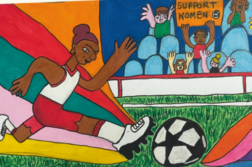Following the cancellation of yet another sporting fixture – this time golf’s Open Championship – it is worth analysing the array of cancelled and postponed sporting events as a result of the Coronavirus pandemic, and highlighting the significance of each.
I actually had tickets to this year’s Open Championship, due to be held at Royal St George’s, Kent, on the 13th-19th July. Like with all the fixtures in this article, the decision to cancel was deliberated for a number of weeks, with the event organisers determined to find a solution that would allow the event to take place. Due to the nature of golf, some suggested the event should be played with no crowd, but concerns remained over the safety of the players and their teams.
Since the tournament’s formation in 1860, this will be only the fourth cancellation, and the first time since the Second World War. Other occasions have been the First World War and once in 1871, when no trophy was available, because previous winner Tom Morris Jr was allowed to keep the Challenge Belt for winning three times in a row. Unfortunately, no one had thought to create a new trophy for the next year… well, at least they learnt a lesson for the future!
The 149th Open Championship will now be held in 2021, at the same venue, with fans being able to carry over their current tickets.
http://gty.im/1209379736
One of the most significant cancellations of recent weeks was of the 2020 Olympic Games, due to be hosted by Japan’s capital, Tokyo. This decision was an equally late call, especially considering the pleas for its cancellation weeks beforehand. The Olympics, an event where over 10,000 athletes and millions of spectators from all over the globe descend on one location, clearly could not go ahead during a worldwide pandemic.
The event organisers were very clear though that there could not be a full cancellation, and instead, just like UEFA Euro 2020, they have labelled the event as ‘postponed’ until 2021. This is likely due to the sizable $12billion spent by Japan in the conception and construction of the event. The Olympic Games have never been postponed in this manner before, although they were cancelled on account of the World Wars, in 1916, 1940 and 1944.
To make room for the global event to take place in 2021, a number of significant sporting fixtures due to be held next summer will now have to be postponed or cancelled, including the World Athletics Championships and the Swimming World Championships. The knock-on effect is truly unprecedented.
On what was due to be its 134th year, the Championships at Wimbledon too were cancelled. As it’s an annual event, this year’s will not be rescheduled, and the next event will be next June as planned. Similarly to the Olympic Games, Wimbledon – which was founded in 1877 – has only been cancelled before in response to the two World Wars.
The cancellation is particularly significant for older players such Roger Federer and the Williams sisters, who may have been looking to retire after this year’s major tournament season; as well as for Djokovic, the world number one, who had been aiming to achieve a calendar Grand Slam by winning all of the year’s majors.
Here in England, one of the biggest upsets (as usual) relates to the football leagues. The sport’s season, including for the Premier League and the EFL, has been placed on hold until further notice during the coronavirus crisis. Football has been one of the most affected sports in regard to the number of players and staff members with the virus or isolating due to possible symptoms.
Matches were cancelled from mid-March, with an expected restart date of the beginning of May. This was later extended indefinitely, with a restart moving further and further away as lockdown continues. There are ongoing debates about whether the season should be concluded when safe to do so, if it should be declared null and void, or if the standings should be accepted as what they were when football was suspended.
The outcome of the decision will be hugely significant for league leaders Liverpool, who were set to win their first Premier League title. Conversely, the decision turns doom into delight for the likes of Norwich City, who were on the brink of relegation. There are questions on whether it would be fair to send them down to the Championship when they have not had the opportunity to play the remaining games that could have secured their place. It has been suggested that the three teams in the relegation zone could stay in the league next season, being joined by the top-two teams from the Championship.
Football leagues were last affected in this way during the Second World War, with the 1939-40 league being suspended after just 3 matches. During this period no title was awarded. It will be interesting to see the outcome of this year’s suspension: the 2019/20 football season will undoubtedly go down in history, regardless of whichever decision is eventually pursued.
Another sporting calendar suspended due to the coronavirus pandemic has been the Formula 1 season. Like with the criticism placed on the organisers of the Olympics, the decision to cancel the Australian Grand Prix back in March was deemed as a little too late by fans, teams and the media.
All 10 teams, hundreds of crew members, and thousands of fans had already descended on the circuit, with drivers attending media interviews and photo shoots. The crowds were even allowed to queue in great masses to enter the grandstands. It was only early in the morning of the day when practice was set to begin that the organisers and top figures in the FIA made the decision to cancel the event. This was likely further motivated by McLaren’s withdrawal from the race after a team member had displayed COVID-19 symptoms.
This decision was later followed by the postponement of Bahrain, Vietnam and all other race weekends up to mid-June. As it stands the first race due to take place will be France, on 26th June. At this time Monaco has been the only race weekend to have been fully cancelled with no plan of rescheduling.
The biggest losers from the suspension of the racing calendar are the drivers for whom the 2020 season was paramount in proving themselves and securing the place in their teams. It is a very interesting period, because apart from Max Verstappen and Charles Leclerc, no drivers have contracts for the 2021 season or beyond. The lack of races will make decisions more difficult for team bosses, who have less opportunity to see their drivers on track. For more on this see Tom Clabon’s article.
For runners and running fans alike, another blow came with the postponement of the London Marathon, which was set to take place on 26th April. The event will now be held on 4th October this year. This particular postponement is especially prominent, for it is first postponement in the event’s 39-year history.
All decisions to cancel and postpone events were necessary and correct for the health and safety of all involved, but in times of low morale, many seek the distraction of sports fixtures as a remedy. Consequently, I have been delighted to see athletes from all areas stepping up to maintain positivity and find a way to enjoy what they love. Many football stars have found themselves on TikTok, entertaining their fans with dance routines, while other athletes run fitness classes online. Formula 1 drivers have even been on their simulators racing in virtual Grand Prixs when the real races should have been taking place.
The world has never experienced a year like 2020 before, and these unprecedented times can’t help but have a significant impact on the sport we love to watch. The significance of these circumstances on players, drivers, athletes and fans alike are enormous, and it will be sure to impact sports for a number of years.



